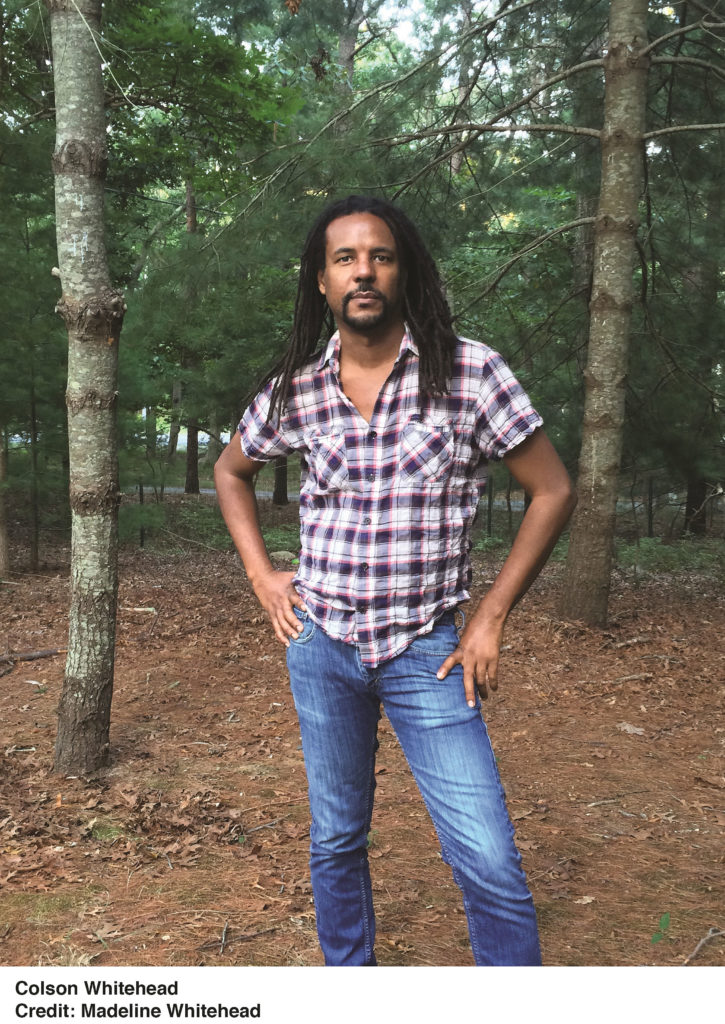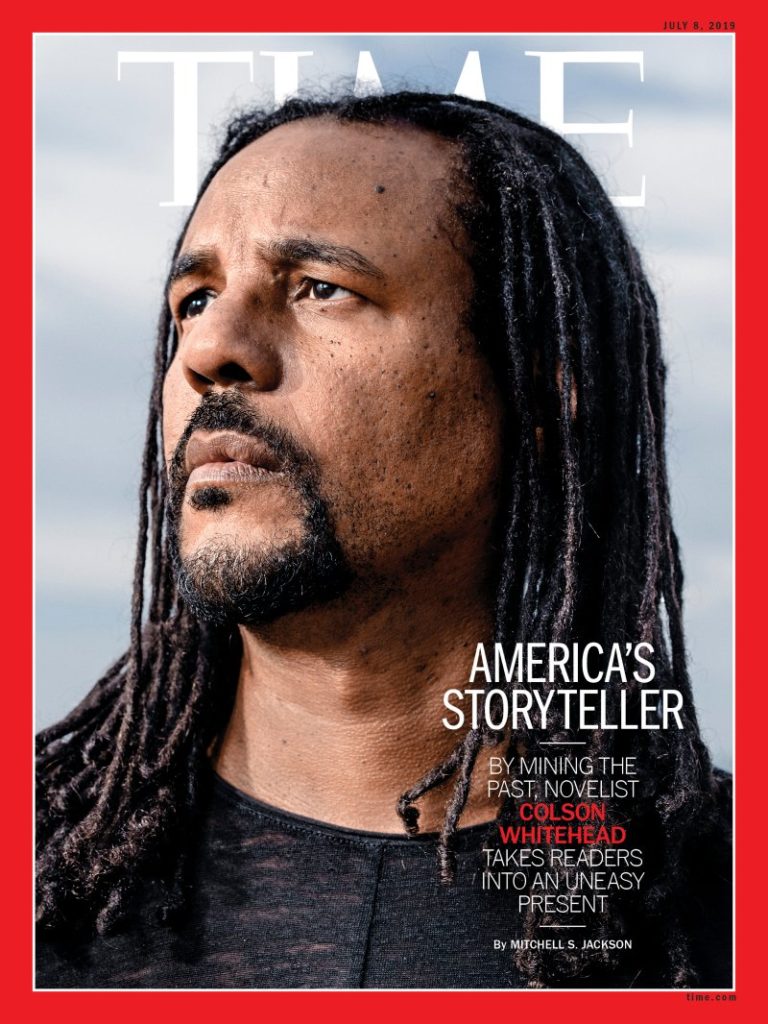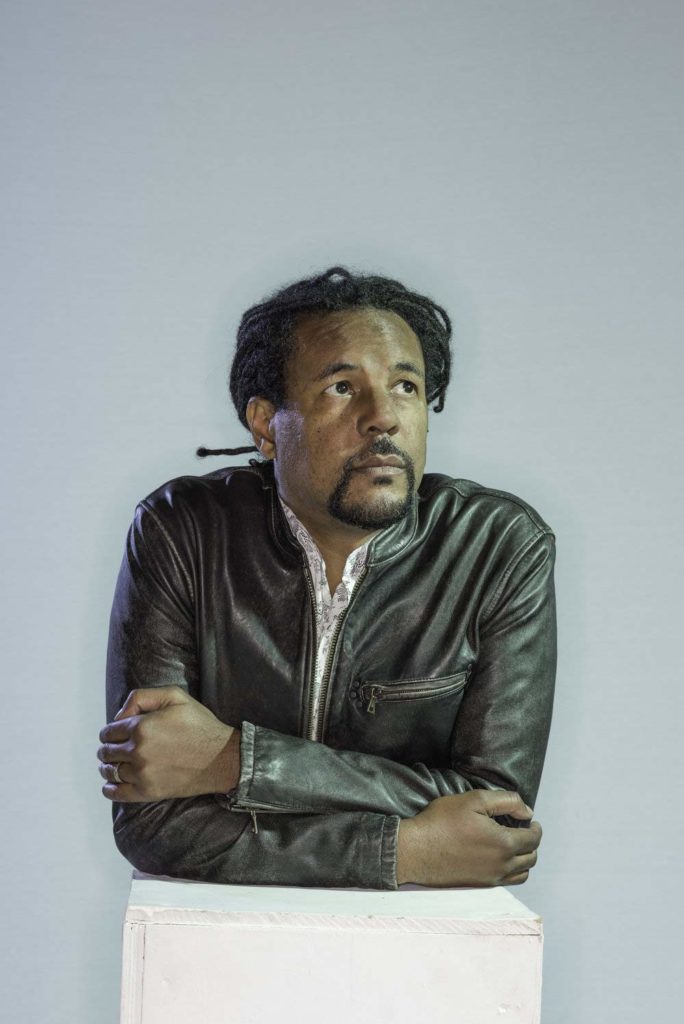
On September 24, Literary Arts will close out our 2019-20 season of Portland Arts & Lectures with Colson Whitehead, author of The Nickel Boys and The Underground Railroad, a New York Times best seller which won the Pulitzer Prize in Fiction and the National Book Award.

Following his lecture, Whitehead will be interviewed by Mitchell S. Jackson, a task that Jackson has previously taken on. Jackson’s cover story interview of Whitehead in Time, titled ‘I Carry It Within Me.’ Novelist Colson Whitehead Reminds Us How America’s Racist History Lives On, was published in June of 2019, when The Nickel Boys was released. It paints a portrait of a writer achieving mastery over his craft.
“A piece of art really works when you see yourself in the main characters and you see a glimpse of yourself in the villains.”

Want to write like Colson Whitehead? Whitehead lays out his rules for writing in this article, titled How To Write, published in The New York Times.
Rule #1?: Show and Tell.
“Most people say, ‘Show, don’t tell,’ but I stand by Show and Tell, because when writers put their work out into the world, they’re like kids bringing their broken unicorns and chewed-up teddy bears into class in the sad hope that someone else will love them as much as they do.”
1920PAL_Whitehead-Virtual_Print-Program_5x7-bifold_FINAL-FINAL
Read a short bio of Colson Whitehead and Mitchell S. Jackson on the second page of the event program above.
Interested in more? Below is a long bio of Whitehead’s life and writing career thus far.
Colson Whitehead was born in 1969, and was raised in New York City. Whitehead’s semi-autobiographical fourth novel, Sag Harbor, is informed by that experience as one of the few black students at an elite prep school and those summer escapes.
Whitehead left New York for undergraduate studies at Harvard College, where he determined that he wanted to be a writer. Of his time at college, Whitehead has said, “I wasn’t a particularly ambitious student. I played cards. Poker and bridge. But that’s where I first encountered James Joyce and Thomas Pynchon and a lot of the great books that I still refer to in terms of inspiration and structure.”
After graduating, Whitehead started working at a New York City alternative weekly, The Village Voice, where he wrote reviews of television, books, and music. In his spare time, he began drafting novels. The year 1999 saw the publication of his first book, the speculative fiction novel about an elevator operator, The Intuitionist. Whitehead’s parents were slow to support his writing career, hoping that he would instead choose a more lucrative or secure line of work. That changed after The Intuitionist. “It wasn’t until my first book was finally out and they could hold it in their hand and it was being reviewed that they would stop urging me to get a real job,” Whitehead has joked. The Intuitionist was a finalist for the PEN/Hemingway Award and won the Quality Paperback Book Club’s New Voices Award.
Over the next fifteen years, Whitehead published the best-selling novels John Henry Days, Apex Hides the Hurt, Sag Harbor, Zone One, and nonfiction titles The Colossus of New York and The Noble Hustle: Poker, Beef Jerky & Death.
In 2016, Whitehead published his sixth novel, The Underground Railroad: a tour de force of magical realism that chronicles a young enslaved woman’s journey during a desperate bid for freedom in the antebellum South. The idea for what would become The Underground Railroad occurred to Whitehead in 2000, but he had concerns that he was yet too green of a writer to do the story proper justice. “I thought if I wrote some more books I might become a better craftsperson and, if I was older, I might be able to bring the maturity of some of those years to the book,” Whitehead said in a 2017 interview with The Guardian, “And then, a couple of years ago, I thought maybe the scary book is the one you’re supposed to be doing.”
A number one New York Times bestseller, The Underground Railroad won both the 2016 National Book Award and the 2017 Pulitzer Prize for Fiction. It was included in numerous 2016 best books lists, including The New York Times’ and The Washington Post’s top ten books of the year. An Oprah’s Book Club 2016 selection, Oprah Winfrey wrote of the novel, “From the first page of Colson Whitehead’s extraordinary novel The Underground Railroad, I knew I was reading something ground-shifting.”
Whitehead’s most recent book, the 2019 novel The Nickel Boys, dramatizes another strand of American history through the story of two boys sentenced to the Arthur G. Dozier School for Boys, one of the country’s most notorious juvenile correction institutions, in Jim Crow–era Florida. “It was a story I hadn’t heard before, and it was emblematic of so many injustices that go on every day that you never hear about,” Whitehead said in a New York Times interview. “The survivors are never heard from and the guilty are never punished, they live to a ripe old age while their victims are damaged for life. It seemed like a story worth taking up.”
The Nickel Boys has won the Kirkus Prize for Fiction, was a New York Times Bestseller, a finalist for the National Book Critics Circle Award, and was longlisted for the Carnegie Medal and the National Book Award.
Additionally, Whitehead has received a MacArthur Fellowship, a Guggenheim Fellowship, a Whiting Writers Award, the Dos Passos Prize, and a fellowship at the Cullman Center for Scholars and Writers. He is set to receive the Library of Congress Prize for American Fiction on September 25, 2020. He was a PEN/Faulkner Award finalist and, in April 2017, he was named one of Time Magazine’s “100 Most Influential People,” and was on the cover of the same magazine in 2019. He has taught at numerous universities, and his reviews, essays, and fiction have appeared in publications such as the New York Times, The New Yorker, New York Magazine, Harper’s, and Granta. Whitehead has just turned in his latest book, Harlem Shuffle, a crime novel slated to be published in fall 2021.
“I hope that right now there’s a young kid who looks like me, who sees the Library of Congress recognize Black artists and feels encouraged to pursue their own vision and find their own sacred spaces of inspiration.”
whitehead, on the announcement of his forthcoming award of the Library of Congress Prize for American Fiction
For more information about the Dozier School for Boys (the notorious state-run reform school that inspired The Nickel Boys), listen to this NPR episode of All Things Considered or read this article from The Washington Post.
For more about Colson Whitehead, visit prhspeakers.com or colsonwhitehead.com.


